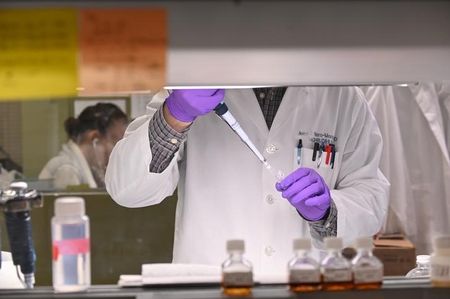 1
1 1
1
By Leroy Leo and Bhanvi Satija
(Reuters) -The U.S. Food and Drug Administration (FDA) on Friday approved two gene therapies for sickle cell disease, making one of them the first treatment in the United States based on the Nobel Prize-winning CRISPR gene editing technology.
Casgevy, developed by partners Vertex Pharmaceuticals and CRISPR Therapeutics, and bluebird bio’s Lyfgenia were approved for people aged 12 years and older.
Sickle cell disease (SCD) is a painful, inherited blood disorder in which the body makes flawed, sickle-shaped hemoglobin, impairing the ability of red blood cells to properly carry oxygen to the body’s tissues.
The disease, which can be debilitating and lead to premature death, affects an estimated 100,000 people in the United States, most of whom are Black.
The Vertex-CRISPR therapy has a U.S. list price of $2.2 million, while bluebird’s is $3.1 million. Both therapies, pitched as one-time treatments, will be available in early 2024.
Two Wall Street analysts said bluebird’s higher price and safety warning would hinder its sales in comparison to Casgevy.
Shares of bluebird fell 40% on Friday, while U.S.-listed shares of CRISPR Therapeutics fell 8% and those of Vertex dropped 0.5%.
Casgevy is based on CRISPR, discovered by Jennifer Doudna and CRISPR Therapeutics co-founder Emmanuelle Charpentier, that uses molecular “scissors” to trim faulty parts of genes that can then be disabled or replaced with new strands of normal DNA.
Bluebird’s gene therapy, on the other hand, is designed to work by inserting modified genes into the body through disabled viruses.
“The approval of the first gene therapies for SCD represent a tremendous step forward for the SCD community, which has been historically overlooked and underfunded,” said American Society of Hematology President Robert Brodsky.
In separate clinical trials, both the treatments helped reduce painful episodes in patients with the disease, with 29 of 31 patients receiving Casgevy, and 28 of 32 patients on Lyfgenia showing improvement.
“Today’s actions follow rigorous evaluations of the scientific and clinical data needed to support approval, reflecting the FDA’s commitment to facilitating development of safe and effective treatments for conditions with severe impacts on human health,” said FDA official Peter Marks.
The FDA has added a warning to Lyfgenia’s label on the risk of blood cancer after acute myeloid leukemia was found in two patients in bluebird’s trial. FDA officials said it had not seen such cases in Vertex patients, but would watch for side effects.
Data on lasting effect of the therapies is limited, so the companies plan to assess potential long-term safety risks through a 15-year follow-up study after approval. The FDA said patients would be monitored throughout their lives for cancer malignancies.
Treatment with the gene therapies can take several months and involve high-dose chemotherapy, with a potential risk of infertility.
While fertility preservation methods like freezing eggs and sperm banking are covered under commercial insurance, bluebird CEO Andrew Obenshain said the company is seeking coverage in government-supported plans.
The only longer-term treatment for sickle cell disease is a bone marrow transplant, but that requires matching donors.
Other standard care for sickle cell patients have been chemotherapy drug hydroxyurea, or once-daily drugs such as Pfizer’s Oxbryta, which aim to slow the breakdown of red blood cells.
For Vertex’s therapy, patients must have stem cells harvested from their bone marrow. The cells are then sent to manufacturing facilities where they are edited using CRISPR/Cas9 technology. Once the cells are incubated, they are infused back into the patient during a month-long hospital stay.
Vertex’s CRISPR therapy is also under FDA review for another blood disease, transfusion-dependent beta thalassemia, with a decision expected by March 30.
(Reporting by Sriparna Roy, Leroy Leo, Christy Santhosh and Bhanvi Satija in Bengaluru, and Julie Steenhuysen in Chicago; Editing by Caroline Humer, Bill Berkrot and Shinjini Ganguli)